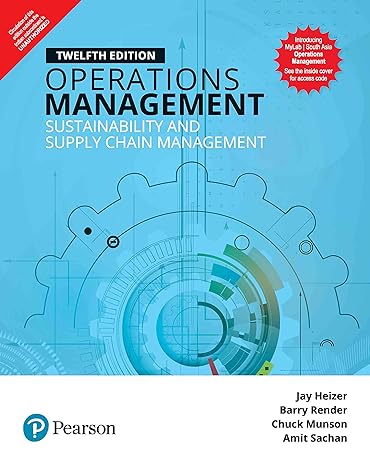The Tata Steel Tubes Strategic Business Unit (SBU), the largest domestic manufacturer of steel tubes, was formed
Question:
The Tata Steel Tubes Strategic Business Unit (SBU), the largest domestic manufacturer of steel tubes, was formed after the merger of the erstwhile Indian Tube Company with Tata Steel in October 1985. It has been an independent strategic business unit of Tata Steel since August 1993, headed by the Executive in Charge (Tubes). The Tubes SBU is the first tube company in the country to obtain ISO-14001 certification in environmental management systems. It has been ISO-9001 certified, which addresses in-process inspection/tests/performance audits and corrective and preventive actions to ensure product and service quality. Precision welded tubes are manufactured by the high frequency induction welding process. In order to become a world-class manufacturer and supplier of precision tubes, Total Productive Maintenance (TPM) was introduced in October 2000 to improve the overall effectiveness of equipment and all-round business excellence. The reasons behind TPM implementation in the organisation included several external factors (tough competition from competitors, the need to expedite new product development, increased raw material costs and high customer expectations regarding quality and delivery) and internal factors (unsafe workplaces, low productivity, high defects, poor equipment conditions, frequent equipment breakdowns, dirty and oily floors, long search times for tools and materials, low worker skills and motivation). The formal TPM kick-off took place in September 2001.
The Tubes Division has business objectives in place to achieve growth and cost leadership that includes:
• being a dominant player in the tubes business with a turnover of Rs 1,500 crore and a net profit of Rs 100 crore in the financial year 2008 by incorporating world-class technology;
• Delivering superior products and services to our customers and upholding Tata values of good governace and ethical business practices in our SBU; and
• Continuing to improve the quality of life of our employees and the communities we serve.
In line with the division’s objectives, TPM policy has been framed as follows: striving relentlessly to become a world-class manufacturer and supplier of precision tubes by integrating and adapting all business excellence initiatives with total productive maintenance as the working philosophy. The goals framed by the organisation to achieve the objectives include:
• maximising overall equipment effectiveness;
• achieving 100 per cent delivery compliance;
• reducing cycle time in all processes; and
• Attaining industry leadership on cost and quality.
Employees were provided with extensive training to improve their competencies related to their jobs and visits were also arranged to different TPM industries to acquaint employees and managers with best TPM practices available in the country and globally. Managers and supervisors were also encouraged to attend TPM-related training courses and TPM conferences.
A skill gap matrix was prepared for all employees and supervisors on the basis of the desired and present skill levels of the workforce. Appropriate training programs were then developed and deployed for employees throughout the organisation. The contribution of TPM initiatives on the model machines was demonstrated with the help of Japan Institute of Plant Maintenance (JIPM) consultants. The TPM kick-off was organised by the MD of Tata Steel in September 2001. The analysis of the results of TPM implementation reveal that the organisation has reaped significant benefits as a result of strategic TPM implementation program. The results reveal that the organisational manufacturing performance improvements realised as a result of strategic TPM implementation included:
• 78 per cent improvement in productivity (tonnes/month);
• 92 per cent improvement in Productivity (tonnes/man/ year);
• 59 per cent improvement in overall equipment effectiveness;
• 63 per cent reduction in equipment breakdowns and failures;
• 85 per cent reduction in customer complaints;
• 22 per cent improvement in delivery compliance;
• 140 times enhancement in operating profits;
• 80-90 per cent reduction in rejections;
• the realisation of zero major accidents;
• 80 per cent reduction in minor accidents;
• 10 per cent improvement in plant yield;
• 43 per cent reduction in variable costs;
• 34 per cent reduction in work-in-process inventory; and
TPM implementation has also resulted in the realisation of several intangible benefits, such as:
• Clean and safe workplace;
• Change in management thinking (before TPM management was thinking ofclosing the plant, but after introducing TPM management is in the process of modernising the
plant); and
• High workforce morale.
Discussion Questions
1. State the reasons behind TPM implementation?
2. Comment on business objectives & TPM policy?
3. How was TPM implemented?
4. What are the benefits of TPM implementation?
Step by Step Answer:

Operations Management Sustainability And Supply Chain Management
ISBN: 234357
12th Edition
Authors: CHUCK MUNSON & AMIT SACHAN AND . JAY HEIZER , BARRY RENDER





